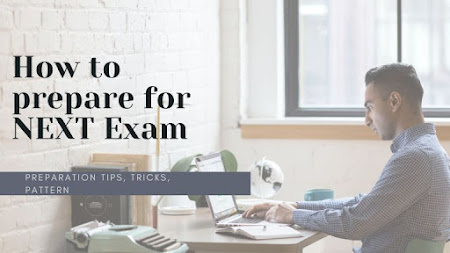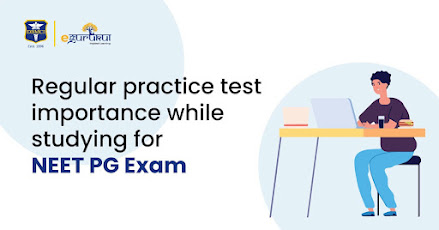HOW TO PREPARE FOR THE NEXT EXAM?
While NEET PG presented its own set of difficulties for medical students, the topic of discussion today is: What’s NEXT? National Exit Test (NEXT) is a replacement for NEET PG in 2019 by the Indian government. Now the NEXT will take place from 2023. The official announcement has been done. NEXT will bet the standard national test for all MBBS students, replacing NEET PG and the MCI Screening Test (FMGE: Foreign Medical Graduate Test) as a single-window examination. Both Indian and international medical graduates will have to pass the NEXT exit test to begin their internship. The Next Exam test score (rank) will also be the criteria for allocating PG (MD/ MS/ DNB/ Diploma) seats in Indian government and private medical institutes. Next Exam 2022 will assess final-year MBBS students’ conceptual comprehension and problem-solving abilities.
Exam Pattern
Students have been speculating about the pattern of the exam ever since the announcement. As per the speculations, NEXT will have two parts: theory (NEXT-1) and practice (NEXT-2). There will be multiple-choice questions (MCQs) for the theory section. Students will begin internship after passing NEXT-1. Those who pass the theory exam (NEXT-1) must also pass the practical exam (NEXT-2) after the clinical rotation. After the internship, your NEXT-1 score will assist you in obtaining a PG seat. NEXT-2 grades will not have an impact on the allocation of a PG seat. As a result, NEXT-1 will be both a qualifying and a competitive exam. To pass NEXT, you will get an unlimited number of tries, but the NEXT-1 test score will be valid for 2 to 3 years for the PG Entrance ranking.
Syllabus
The syllabus of the NEXT examination will comprise all 19 subjects from the revised MCI curriculum. However, the subject-wise mark distribution will vastly differ from that of the Neet PG Preparation or FMGE. Clinical topics will receive higher weightage than the pre-clinical and para-clinical ones. NMC (National Medical Commission) and NBE (National Board of Examination) discussed this plan, but the NTA is yet to make an official announcement.
TIPS TO PREPARE
Starting with the MBBS batch of 2017, NEXT will be implemented (proposed) for the first time in 2023, and right now, students in their third year of MBBS will attempt the test for the first time.
1. Sharpen your Basics.
Since 90% of the NEXT questions will test your problem-solving abilities and understanding, students must begin focusing on the fundamentals. The updated NEXT pattern is likely to reduce the rote learning strategy used by MBBS students to pass their PG medical entrance examinations. This MBBS exit test will include questions that integrate pre-clinical, clinical, and para-clinical learnings, and you will have very little chance of passing if you have not dedicatedly focused on refining your core notions. Ensure that you strengthen your fundamental concepts. By watching DBMCI videos, you will strengthen the foundation, upon which the remaining course structure is built.
2. Emphasise on Critical Concepts
One cannot overstate the relevance of clinical topics in securing a PG seat. The most remarkable difference between NEET PG and NEXT EXAM is the proportion of clinical questions. You should give experiments special attention because questions will judge you on what you did rather than what you read. Pay special attention to your practicals and attempt to apply what you have learned. One good way of keeping critical concepts on your tips are by practicing customised tests for the concepts you’re weak in. On the DBMCI app, you can choose whichever topics you struggle with and practice them till they’re on your tips.
3. Never leave out an Entire subject
Speculations are that NEXT would have a lot smaller syllabus than NEET PG due to the planned test pattern’s fewer courses and that you will not need to study as much. That is not quite correct. Even though several things are unclear in the NEET PG – NEXT 2022 test schedule, the overall MBBS syllabus will overlap with NEXT’s coverage.
4. Attempt Previous Years’ NEET PG and AIIMS PG papers
Hints for the exam pattern for NEXT have been clear with the recent change in neet pg previous year question paper. The paper is now more clinically focused than it has ever been. The most recent NEET PG observed clinical and applied questions, such as films of various tests and photographs of multiple diagnoses. The percentage of para-type questions was disproportionately higher, resulting in the paper being lengthier than usual.
5. Begin Early
Another vital point to consider is that students previously had approximately 9-11 months to prepare for NEET PG; however, with the introduction of NEXT, those additional months will not be available because NEXT-1 will be conducted in the final year, rather than post-internship. MBBS students, particularly the final-year medical students, will now be expected to achieve a bit more to earn the title of ‘Doctor.’ If you intend to begin studying for PG medical admission examinations in your third year, we recommend starting your prep in the second year.
HOW TO STUDY WITH THE DBMCI APP:
DBMCI is designed to ensure maximum user interface and offer users a quality experience without any interruptions. Therefore, students should follow this pattern recommended by the professors, which helps them prepare properly. So, it is recommended to watch DBMCI initial first four medical pg coaching videos and then refer to and read the same topics from the main textbook. This way, you’ll have a basic idea before you refer to the topic, making complex topics easier to grasp.
After completing the four videos, go back and watch the next four videos (5-8) and then again read the topics from the main textbook. Once you have completed the drill, it will help you understand what the professor is explaining and will clear all your doubts in more depth. This will eventually, make your basic concept concrete and help you visualise the matter; you can proceed with the following Medical PG Coaching Videos and do the same for all subjects.
If you want to clear your concepts in the right way watch the video and then read the textbook. This method will help you in increasing practical visualisation and make you more comfortable in exams.
Ensure that you utilize Qbanks from the DBMCI app. The process for optimal learning will begin with watching the videos, reading the text material, and then attempting the questions from the Qbanks. This not only makes your concepts solid but also assesses how much you have learned, pointing out the areas you can improve. This helps you remember the topics which you studied for a longer period of time. From providing aspirants with last-minute tips to complete exam preparation for long-term and crash courses; the curriculum and Qbanks are regularly revised to make that transition easy for the students and help them crack the exams.DBMCI app is a booster in preparation, helping you smoothly transition from NEET to NEXT.
DIFFERENCE IN STRATEGIES
Students will require two distinct tactics, one for second-year MBBS students and the other for third-year students. As the test curriculum and marks distribution are not standard, we have 3rd-year courses that are incredibly significant, each with a weightage of 60 questions. The PSM will also have a weightage of 60 questions, but in an associated form with other courses.
Students in their second year of MBBS
First and foremost, for 2nd-year students, the optimal method to prepare would be to finish their 2nd-year para-clinical subjects first, including the MCQs. Start reading the 1st year topics after completing the 2nd year topics to gain a firm hold on them and form solid notions. This strategy will assist towards the conclusion of the preparations and save you a lot of time that you can use to solve extra MCQs and read last year’s subjects.
Students in their third year of MBBS
For third-year students, first finish your third-year topics, including the relevant physiology, anatomy, pharmacology, pathology, and microbiology, and MCQs. You cannot skip any of these topics, and it is best if you finish the topics just before your test, not later, but right now, in the next three months. Doing this will help you develop positive pressure and boost your efficiency.
The National Exit Test is just another exam that you can easily pass with the right approach and advice. Do not worry about it any longer. Your struggle with NEXT will last throughout your preparation time, not only on the exam day. So, give your best every day— best of luck with your exam.



Comments
Post a Comment